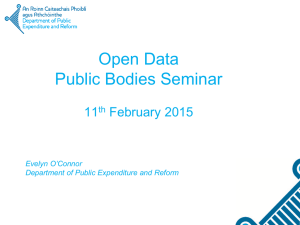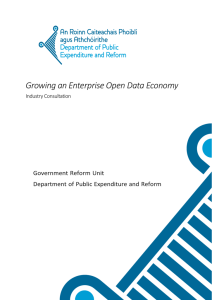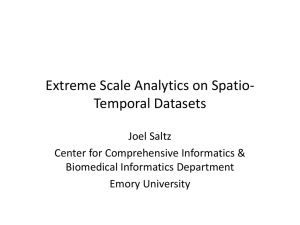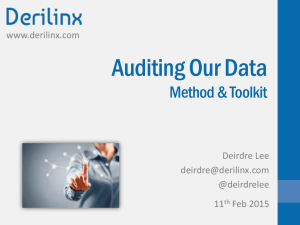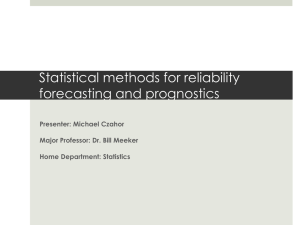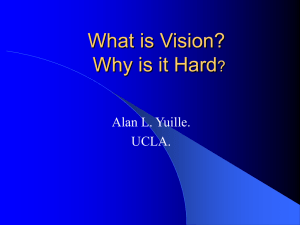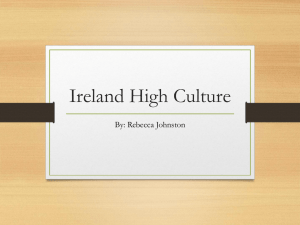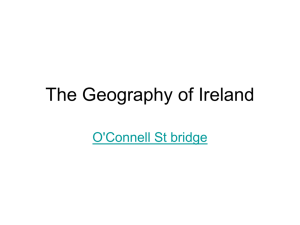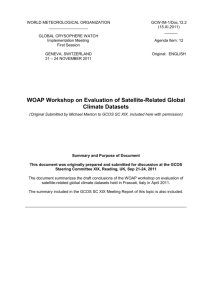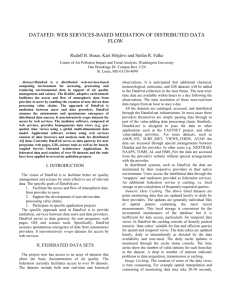here - Department of Public Expenditure and Reform
advertisement
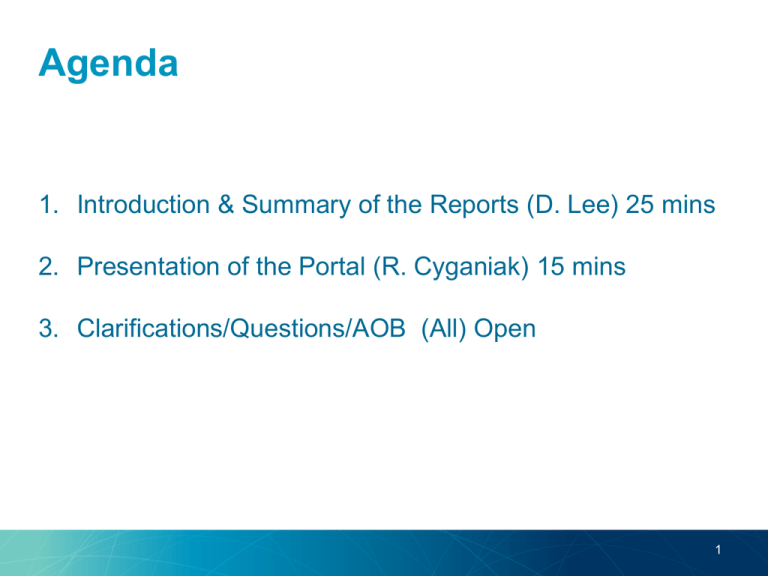
Agenda 1. Introduction & Summary of the Reports (D. Lee) 25 mins 2. Presentation of the Portal (R. Cyganiak) 15 mins 3. Clarifications/Questions/AOB (All) Open 1 What is Open Data? OKF’s Open Definition : A piece of data or content is open if anyone is free to use, reuse, and redistribute it — subject only, at most, to the requirement to attribute and/or share-alike. http://opendefinition.org/ 2 Public Service Domains Typical Open Data Questions • How many passengers use public transport each year? • What are the pollution levels in my city? • Which planning applications are under consideration in my area? • How does the budgeted expenditure of a department compare with actual spending? 4 https://www.epa.ie/pubs/reports/water/bathing/thequalityofbathingwaterinireland2012.html http://gis.epa.ie/GetData/Download 5 Impact of Open Data • Political: o government transparency o government efficiency • Social: o environmental sustainability o social inclusion • Economic: o economic growth o entrepreneurial activity Davies, T., Perini, F. & Alonso, J.M., 2013. Researching the Emerging Impacts of Open Data: ODDC Conceptual Framework 6 Economic Value of Open Data • Open Data, not big data, will be driver for growth, ingenuity and innovation in the UK economy. (Deloitte Analytics, 2012). • $1.5 billion: US National Weather Service supporting a private weather industry per year. (CapGemini 2014) • €32 Billion: Estimated direct impact of Open Data in 2010 on the EU27, annual growth rate of 7%. (Vickery 2011) • €140 billion: Estimated aggregate direct and indirect impact across EU27 (Vickery 2011) • $3 trillion: Estimated annual economic potential across seven domains. (McKinsey 2013) Open Government Data in Europe and Beyond Copyright 2014 FUJITSU LABORATORIES LTD. 8 Reusing Public Sector Information: The PSI Directive 2013/37/EU • Introduces a right to reuse • Covers also libraries, museums and archives • Invites Member states to make more documents available in machine-readable and open formats • Protects personal data ~390 Open Data Portals http://datacatalogs.org/ 10 Irish Data Catalogues Title URL AIRO Datastore http://www.airo.ie/airo-datastore Data.cso.ie http://data.cso.ie Databank of the D/F http://databank.finance.gov.ie/ Databank of the D/PER http://databank.per.gov.ie/ Dublinked Open Data Portal http://www.dublinked.ie/ EPA GeoPortal http://gis.epa.ie EPA Secure Archive For Environmental Research Data (SAFER) http://erc.epa.ie/safer/ Fingal Open Data Portal http://data.fingal.ie/ GeoPortal.ie https://www.geoportal.ie/ Interactive Web Data Delivery System https://jetstream.gsi.ie/iwdds/index.html Irish Social Science Data Archive (ISSDA) http://www.ucd.ie/issda/data/ Irish Spatial Data Exchange http://catalogue.isde.ie/ Marine Data Online http://data.marine.ie/ Open Data Ireland Community Portal http://data.opendata.ie/ StatCentral http://statcentral.ie/ The Health Well http://www.thehealthwell.info/ 11 Problems: • Not enough data • No standardised approach • Low-quality data • Not associated with an open license • In many cases not machine-readable • Duplication of work • No central guidance 13 Open Data In Ireland 14 Summary of Reports Insight Open Data Ireland Support Project Best Practice Handbook Data Audit Report Open Data Platform (alpha) Evaluation Framework Open Data Publication Handbook Roadmap 16 Methodology Literature review Desktop research Interviews with representatives from Irish public bodies Focus-group with representatives from the start-up community Attendance of tech meet-ups Invitation for feedback from wider Open Data community 17 Open Data Ireland Objectives (Roadmap) • Short-term Objectives (1 year) Release high-quality Open Data that is timely, comprehensive, and accurate. Develop links with civil society organisations, the business community and citizens. … • Medium-term Objectives (2 years) Work to increase Open Data literacy. Develop a cross-sector data infrastructure ensuring data interoperability. … • Long-term Objectives (3 years) Establish an expectation that all government data be published openly by default. … 18 Open Data Best Practice Handbook Looked at International Best Practice Looked at Current Irish Practice Made Recommendations 19 Open Data Ecosystem Elements 20 Governance Open Data Board (governance, support, oversight, advisory, evangelism) Steering & Implementation Group (steering, implementation, awareness & capacity building, evaluation) Open Data Officer/Team (DPER) (portal, administrative, funding) Open Data Roadmap 21 Licensing Open Data = Open License • The Open License: o Should allow derivatives o Should allow commercial use o May require attribution o May require share-alike • Creative Commons 22 Data Privacy The rights of the individual to privacy must be protected Usage of personal data, even aggregated usage, should be transparent to the individual For the publication of aggregated, statistical data, use standardised statistical methods Do not use data privacy as an excuse not to publish Open Data if there are no data privacy concerns. 23 Data Audit What data does your PSB manage? Is there any justification not to publish data as Open Data? (Open by Default) 24 Data Audit Report G8 Open Data Charter Category Companies Crime and Justice Earth Observation Web crawl of public sector websites Education • XLS,CSV, XML, KML, RDF, SHP, etc. Finance and contracts Keywords Global Development • Review of relevant existing data catalogues Searches for specific highvalue datasets Energy and Environment Geospatial Government Accountability and Democracy Health Science and Research Social Mobility and Welfare Statistics Transport and Infrastructure 25 Dataset Selection High-value information is information that can be: used to increase agency accountability and responsiveness; improve public knowledge of the agency and its operations; further the core mission of the agency; create economic opportunity; or respond to need and demand as identified through public consultation (U.S. Office of Management and Budget, 2009) 26 Key Datasets • National map data • Postcode data • Company data • Demographic data • Public expenditure data • Transport data • Road network data • Energy and environment data • Election data 27 Address & Map Data Sale of UK Postcode Address File: “This takes an immediate but narrow view of the value of such datasets. PAF should have been retained as a public data set, as a national asset. The sale of the PAF with the Royal mail was a mistake. Public access to public sector data must never be sold or given away again” (The Public Administration Select Committee (PASC), 2014) Danish address data, available free from 2002: Cost EUR 2 million Direct financial benefits for 2005-2009 EUR 62 million Worth investigation into total/partial release of Irish address, postcode and map data as Open Data 28 High Quality Data • Data formats • Metadata • Data standards • Unique Identifiers 29 Data Formats http://5stardata.info/ 30 Data Access • Bulk data • APIs http://dublinked.com/datastore/datasets/dataset-300.php 31 Data Discovery Data catalogues data.gov.ie 32 Supporting Public Bodies 33 Recommendations for PSBs • Follow best-practices for publishing Open Data, as set out in Handbook • Designate a person/team who is responsible for Open Data • Create an Open Data strategy for your public body, including high-value datasets, goals and a timeframe. • When publishing a high-value dataset as Open Data, assess the complete data lifecycle (e.g. collection, recording, storage, publication, archiving) in terms of potential data sharing, not only data usage for a particular purpose. • Participate in Open Data training sessions. • Ensure the public body is represented on Open Data governance boards. • Communicate suggestions or challenges to Open Data governance boards. 34 Open Data Publication Handbook Step-by-Step Guide to Open Data Publishing (for public bodies) 1. Carry out a Data Audit 2. Select what Data to Publish 3. Ensure Data Protection Laws are Adhered to 4. Associate Data with an Open License 5. Publish Data as 3- to 5-star Open Data 6. Associate Data with Standardised Metadata 7. Use Data Standards 8. Use Unique Identifiers 9. Provide Access to the Data 10. Publish Data on the National Open Data Portal, data.gov.ie 35 36 Engaging Data Users • Demand-driven release of data • Feedback on data published • Hold consultations • Use social media • Hold hackathons / Innovation-days • Engage with existing groups • Run competitions • Run tutorials • Evangelism • Internal promotion • Use traditional media 37 Community Forming 38 Encouraging Economic Reuse Open Data Compass http://www.opendata500.com/ Geospatial Information industry in Ireland generated sales or output valued at €117.5 million in 2012, Ordnance Survey of Ireland. (2014). Assessment of the Economic Value of the Geospatial Information Industry in Ireland (p. 86). 39 Evaluation Readiness Implement ation Impact 40 Open Data Platform (alpha) http://data.gov.ie 41 Roadmap Objectives • Short-term (1 yr) • Medium-term (2 yrs) • Long-term (3 yrs) Recommendations • Based on Open Data Ecosystem Elements Actions • Timeframe (start/end) • Responsible Party 42 Open Data Ireland Next Steps 1. Determine Open Data Officer/Team 2. Create ODB and SIG 3. Public consultation on Roadmap 4. Improve data.gov.ie continuously & iteratively 5. Publish more high-value and high-quality datasets. 6. Engage with stakeholders from general public, business, civil society, public-sector and academia. 7. Widen the Open Data community 8. Evaluate progress and impact 43 Presentation of the Portal and Portal Next Steps Richard Cyganiak data.gov.ie: What’s listed? 1. 175 statistical datasets from the StatCentral catalog o Focus on official statistics o Includes datasets published by 30 different organisations o Curated by CSO 2. 209 geospatial datasets from the ISDE catalog o Focus on geospatial data, built in the context of Inspire o Includes datasets published by five different organisations o Curated by Marine Institute 3. 34 additional datasets o Focus on G8 high-value sectors and other prominent datasets 45 data.gov.ie: What’s not listed? • Datasets that are not on the Web already • Datasets that are not machine-readable • Datasets that need to be licensed for a fee • Organisations other than central government and state bodies o Local government o State-owned companies o Academic and cultural organisations With some exceptions! 46 Open Data Ireland Next Steps 1. Determine Open Data Officer/Team 2. Create ODB and SIG 3. Public consultation on Roadmap 4. Improve data.gov.ie continuously & iteratively 5. Publish more high-value and high-quality datasets. 6. Engage with stakeholders from general public, business, civil society, public-sector and academia. 7. Widen the Open Data community 8. Evaluate progress and impact 47
